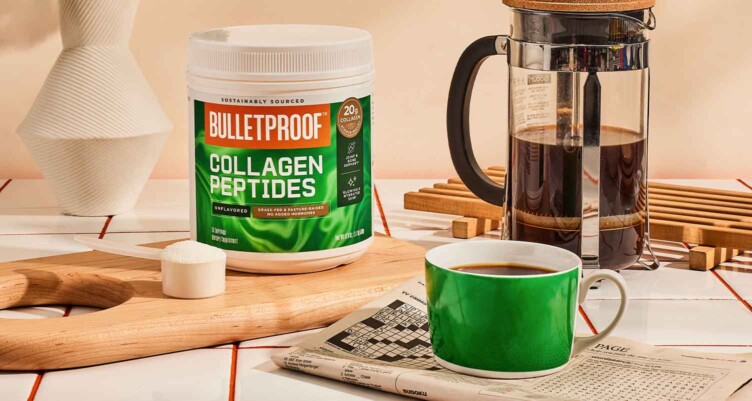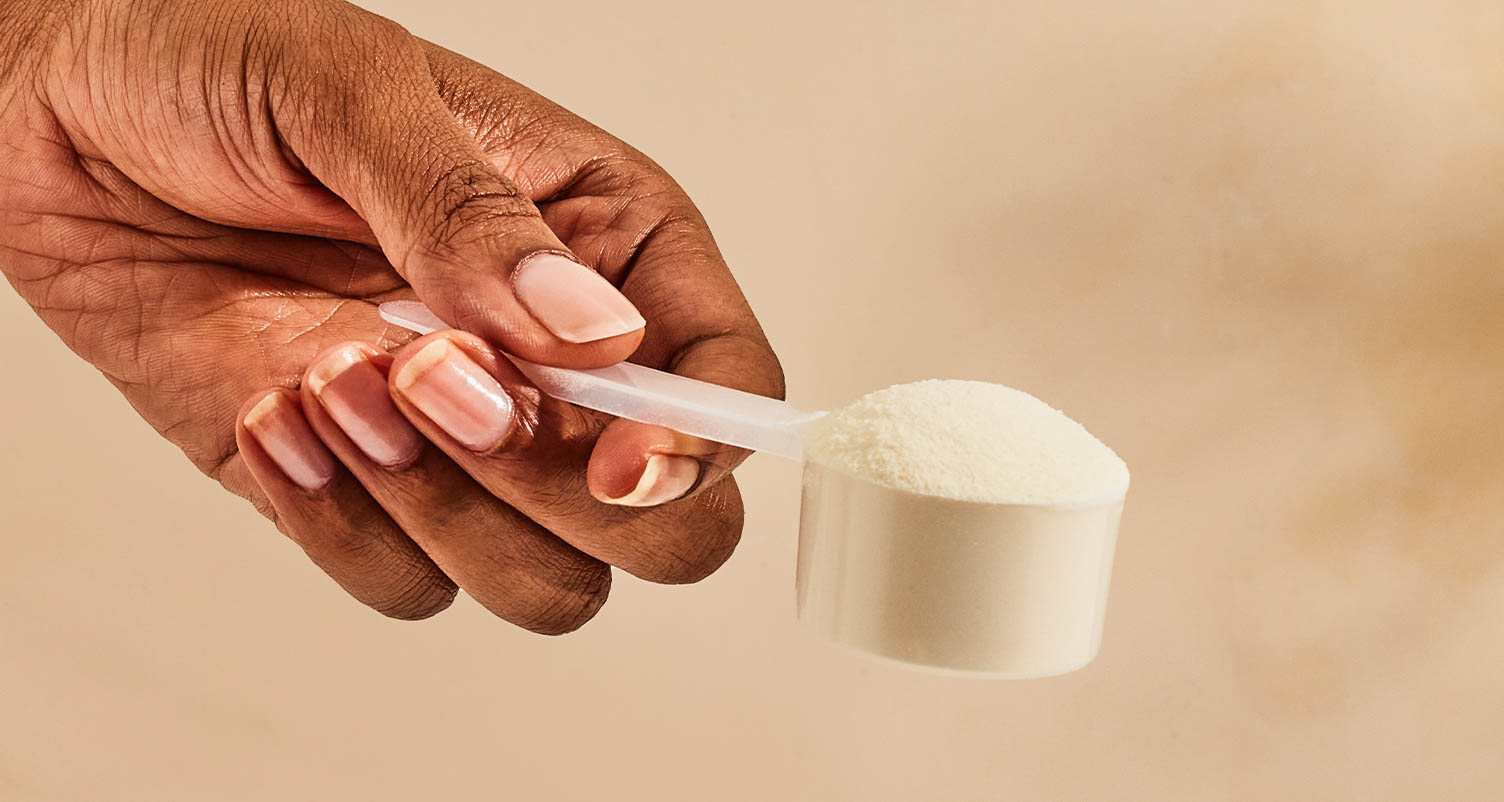Liquid Collagen vs Collagen Powder: What’s the Difference?

- Collagen is a crucial protein that provides structure to various parts of the body, including the skin, bones, muscles, connective tissues, and joints.
- The source and quality of collagen differ between liquid and powder forms.
- Liquid collagen may contain additional ingredients, while collagen powder offers a more straightforward composition.
And liquid collagen vs. powder: what’s the difference? This article gives you the full scoop on what collagen is and the differences between liquid and powder collagen.
Have you been searching for the best way to enjoy the health-boosting benefits of collagen? You’ve likely come across two popular options: liquid collagen and collagen powder. But what exactly sets these two forms of collagen apart?
Collagen is the most abundant protein in the body. It provides structure to the skin, bones, muscles, connective tissues and joints[1]. Collagen can also support healthy skin and can reduce occasional discomfort.
It’s no surprise that collagen supplements have gone viral. But which form of collagen is best?
What is Collagen
The word “collagen” derives from the Greek word “kólla,” which means “glue.”[2] Amino acids are the building blocks of protein. Grouped together, they form connective tissue and give structure to various parts of the body. Interested in learning more? We go more into depth in our complete guide to collagen supplements.
Unfortunately, our bodies stop producing collagen as we age. This usually happens between the ages of 18 and 29[3]. This is where collagen supplements come in, as it’s their job to “top” up your body’s dwindling supply. Most collagen supplements are sourced from the bones, tendons, and connective tissue of marine animals (such as wild-caught fish and shellfish) and farm-raised animals (such as chickens, pigs and cattle)[4].

Benefits of Taking Collagen
Getting in your daily dose of collagen means serious benefits from head to toe. Some of the benefits to get excited about include:
Improved skin, hair and nail health
The benefits of collagen for your skin are at the forefront of most conversations about collagen. The biggest takeaway? This mighty protein improves skin elasticity, hydration and texture.
In one study, women between the ages of 45 and 60 were given hydrolyzed marine collagen for 12 weeks.[5] Afterward, researchers reported significant improvement in the overall firmness of the skin and the appearance of wrinkles.
Another study found that collagen is a shield against the triggers that contribute to premature aging, such as free radicals (pollution and the sun’s UV rays)[6].
Last, collagen does a number on the hair and nails by lengthening and strengthening. For example, 25 participants in a nail strengthening study took two and a half grams of specific bioactive collagen peptides daily for 24 weeks. In that time, nails grew 12% and there was a 42% decrease in the frequency of broken nails[7].
Stronger bones and joints
Taking care of your bone health is of the utmost importance, especially as you age. Doing so prevents osteoporosis, a disease that decreases bone mineral density and bone mass[8]. This can cause bones to become fragile and may fracture or break which is why prevention is key.
A research study found that taking collagen peptides powder daily for a year led to increased bone mineral density in postmenopausal women (considered a risk factor group)[9].
People who experience cartilage loss from osteoarthritis and rheumatoid arthritis can also benefit. Collagen helps regrow cartilage and helps with joint inflammation and pain[10].

What is Liquid collagen?
Liquid collagen is a supplement that contains collagen proteins suspended in a liquid. Liquid collagen is hydrolyzed. This means that the peptides it contains are broken down into smaller pieces, making it easier for the body to absorb.
While many forms of liquid collagen exist, bone broth is a tried-and-true option (try our homemade collagen bone broth recipe). Bone broth is a nutrient-dense liquid that’s made from boiling down meaty animal bones and connective tissue.
Another great option is pre-made liquid collagen drinks. These are ultra-convenient, come in a variety of sizes and contain between four to 10 grams of collagen per serving (depending on the product). Many premade liquid collagen drinks can contain added ingredients, such as vitamins, minerals, and artificial flavors so it’s essential you trust the manufacturer and read the ingredients list carefully.
Adding Bulletproof Unflavored Collagen Peptides to your favorite smoothie or coffee is a great way to get the trusted benefits of collagen in liquid form.

What is Collagen Powder?
Collagen powder is collagen in powder form. Like liquid collagen, it contains hydrolyzed collagen AKA collagen peptides. After the animal protein is hydrolyzed, the raw materials are processed into a fine powder that you use to add to your favorite foods and drinks.
Powder collagen contains around 10 grams of collagen per serving. We recommend consuming at least 10 to 30 grams of collagen per day.
There are so many creative and delicious ways to incorporate collagen powder in your daily diet. Mix it into a bowl of yogurt or a smoothie bowl or add it to a hot bowl of liquid, like your morning coffee. Collagen powder is also great to bake with since it’s easy to mask the flavor without losing the nutritional benefits.
We have an assortment of delicious collagen powder recipes to satisfy your every craving.
One downside to powdered collagen is that it does require some work. Unlike liquid collagen, which is pre-made and ready to consume, collagen powder must be added to food and drinks.

What’s the difference between liquid collagen vs collagen powder?
The differences between liquid and powder collagen go beyond the obvious—that one is a liquid and one is solid. There are other factors to consider, such as the amount of collagen per serving, added ingredients, convenience, quality, and sourcing. Learning what sets these two apart puts you one step closer to choosing your supplement.
Collagen serving size
As mentioned above, there is no official recommended daily amount of collagen. But 10 to 30 grams per day is a good target to meet. You’ll have less of a problem with this if you take powder collagen, which often has a minimum of 10 grams of collagen per serving (Bulletproof Unflavored Collagen Peptides contains a whopping 20 grams of hydrolyzed collagen for two scoops!). Liquid collagen pales in comparison at 4 to 10 grams, which means spending more money to reach your goals.
Added ingredients
We already touched on the added ingredients in liquid collagen. While some of these are beneficial, like vitamins and caffeine, others such as sweeteners could add ingredients your body doesn’t need. The opposite can be said with powder collagen; essentially what you see is what you get.
Convenience
It doesn’t take long to scoop collagen into your morning smoothie, but it is longer than popping open a liquid collagen drink.
Source and quality: There are five common types of collagen[11]:
- Type I
- Type II
- Type III
- Type V
- Type X
Liquid and powder collagens are primarily made up of Type I and III. So, what’s the difference?
Let’s start with Type I, which is made up of skin, tendons, and connective tissue from primarily marine and farm animals.
Both types of collagens have their own distinctive benefits. Type I is more bioavailable than other types of collagens[12]. Meanwhile, Type III works in conjunction with Type I to improve skin health and act as a building block to healthy ligaments, joints, and bones.
By now, it’s clear to see that liquid collagen and powder collagen have their differences. But these supplements also have something in common: collagen powder becomes liquid once you add it to a liquid. Whether you choose liquid collagen or collagen powder, you can’t go wrong with either.
Sign up for early access to sales, product launches, the latest Bulletproof news and more!



